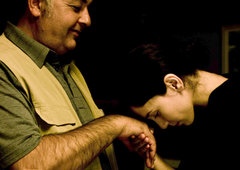When
We Leave played at Montreal's 2010 Festival du nouveau
cinéma. For the festival ratings, click HERE.
Beverly
Quesdat, whose review originally appeared in www.itsjustmovies.com,
gave the film 4.0 out of 4.
It
is important to note right from the beginning of this review
that many Muslin men are faithful, honourable, supportive
and even humble in their marriage relationships. It is also
important to note that a blessing in a tightly knit Muslim
community is a religiously-based cultural tradition that honours
and supports the family unit.
 That
being noted, we are also familiar with patriarchal dominance
in the Arab-Muslim world. Women, though outwardly revered
and protected, do not always have the same legal rights as
men under some interpretations of the Muslim Sharia system.
That
being noted, we are also familiar with patriarchal dominance
in the Arab-Muslim world. Women, though outwardly revered
and protected, do not always have the same legal rights as
men under some interpretations of the Muslim Sharia system.
The
film When We Leave (Die Fremde) examines what happens
when a husband misuses (from a Western perspective) his dominance
and power. What options do Muslim women from conservative
communities have in unhappy or abusive marriages?
Interestingly,
while this film begins in Turkey where the protagonist is
living with her husband, she ends up with her son in Germany,
where her parents live and where there is a state-supported
safe house system for women.
Feo
Aladag was inspired to write the screenplay for When We
Leave after participating in Amnesty International’s
Violence Against Women campaign. Her specific interest in
honour killings led her to write this sensitive drama of a
beautiful, intelligent and somewhat plucky young woman, played
with agonizing passion by Sibel Kekilli, a German actress
born in Turkey.
With
the opening scenes in Turkey, the viewer understands that
the lovely Umay (Kekilli) cannot accept the uncontrollable
rages of her husband. When We Leave is the story
of her life after she takes her young son and leaves to live,
unannounced, with her parents in Berlin.
When
confronted with the disapproval of their Muslim community,
Ulmay’s parents, who demonstrably love their daughter
very much, are faced with social and ethical challenges. One
character dismally tries to explain to Umay that whenever
there is a struggle between the community and the child, the
community always wins.
Umay
cannot accept that. Her family knows she’s a good person.
Her mother sees the marks of abuse on Umay’s back. Her
two younger siblings, a brother and sister, love her dearly
and crave her attention. Her cute little son is devoted and
she is a loving mother. Her father, a good husband and parent,
is obviously conflicted.
So,
what will be the stronger card, love or honor? What will have
the greater pull, family or community?
Aladag’s
tenderly portrayed story, exploring the passionate feelings
of the members of Umay’s family, has been selected by
Germany as its entry in the 2011 Oscar competition for Best
Foreign Film. It deserves this recognition, not only for examining
a sensitive and potentially inflammatory topic, but for telling
it well and with compassion for all sides.
When
We Leave garnered the Tribeca Film Festival Founder’s
Award for Best Narrative Feature. Also, Sibell Kekilli won
Tribeca’s award for Best Actress in a Narrative Feature.
There
are few films, particularly in the mainstream, that can possibly
be more meaningful, beautiful and thought-provoking this year
than When We Leave.